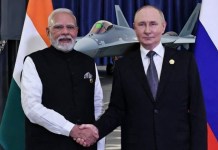With the unexpected dissolution of Afghan peace talks in Doha, US Ambassador Zalmay Khalilzad has tasted the bitter reality of the volatile region. It is indeed disappointing that their vigorous attempts for intra-Afghan peace dialogue did not work-out over petty issues.
India Should Be Ready To Stop The Rise of Taliban; Military Options Should Be Open: Experts
Indeed, an opportunity is lost in pursuant of peace. But, to avert such a fate in future, one must have a close look at the whole process and circumstances that aborted the initiative.
First, let’s focus on the wish list of the proposed participants that Taliban compared with a wedding party. No doubt, the Kabul administration belittled itself by making such a long list that a charter plane needed to be booked for the entourage. In any case, it didn’t make sense to send two hundred and forty people to talk to two dozen militants.
This action only raised the importance of the Taliban when it could be downgraded. Had Kabul shown political maturity and developed consensus on a handful of personalities, the outcome could have been different. Instead, the Ghani government tried to dominate loyal ones and in the end made the list utterly disproportionate.
No one can buy the argument that Ghani’s pick and choose policy was aimed at accommodating all the sections of society. For that, Kabul had already planned a Loya Jirga at the end of this month. The president was simply exposed of trying to play overtly smart and in that lost coherence.
He continued juggling with the list until the very last moment. And, even, the name of former president Hamid Karzai was dropped who had attended a similar inter-Afghan meeting in Moscow.
At the top of that, the president addressed the delegation with some controversial remarks. A day before the scheduled talks, he told the gathering that they were the true representatives of Afghanistan and its nation. And, emphasized to convince the militants to negotiate peace with the Afghan government. It left little room for the Taliban who considers the government as a puppeteer and only got ready to meet officials in their personal capacity. Now, they found this delegation as a mere courier.
A number of reasons can be deduced for why Kabul knowingly opted for this non-reconciliatory path. The most important is that the government wanted to buy more time.
The delayed three-day talks were supposed to start on April 19. Entering talks on the eve of the date first set for the presidential election was enough to raise many eyebrows in Kabul. They knew the Taliban had tactfully pushed the date for the talks to prove their symbolic victory over the ‘sham’ process.
Taliban also took advantage of utter desperation prevalent in teetering Ghani government. Before catching flights to Doha, they launched the retaliatory spring offensive — Al-Fath or Operation Victory.
Ambassador Khalilzad was right to say that the expansion of war couldn’t be a solution. But, the onus was on Afghan forces who added fuel to the fire by pre-empt operation Al Khalid. As a result, the advent of the goodwill was ditched for the season of hostilities that even took the lives of three American soldiers.
Khalilzad saw the house of cards crumbled when he had made every effort to take the process to the next level. With shuttle diplomacy, Khalilzad had successfully negotiated a loose timetable to withdraw most of US troops and secure assurances that the militants would prevent international terrorists from using Afghan soil. Now, he was seeking a ceasefire and an intra-Afghan political settlement.
Bringing Taliban and Kabul administration on the table would have been a feather in his cap. His Russian counterpart had recently outclassed him with a bit similar but low-scale moot in February. For Khalilzad, it was time to bring the ball back to America’s court. Why he couldn’t twist arms to make Doha talks a reality? The reason is obvious.
Time was on his side, but then Khalilzad agreed to postpone presidential elections first till April 30 then July 20 and eventually till September 28. By giving in to the Taliban, Khalilzad lost the bargaining chip and his action became a double-edged sword that fell on himself.
The militants were emboldened and their dictating position became stronger. On the other hand, the Kabul administration felt threatened as it suddenly found itself on borrowed time. The security forces found their future in disarray as rumours spread that they would come under the Taliban.
The situation reminded Kabul with the fate of Pro-Soviet President Najibullah. Three decades ago, he was in a much stronger position when the Soviet Union left Afghanistan. He had also sought reconciliation with the then resistance by offering them 20 seats in State Council and twelve ministries including prime ministership. The communist leader had even tried to lure so-called Mujahideen by showing readiness to declare Afghanistan an Islamic non-aligned state. He did so despite having a far better organized and equipped army. Yet, was dragged from UN compound and hanged in public by Taliban.
It’s a million-dollar question, what Ashraf Ghani can offer them. Taliban cannot compromise on ceremonial posts. They are still ruling fifty-five per cent of the land and may seek the most coveted post. But, can that be offered to those who have developed links with Russia and China or even are dining with Iranians?
And, how about the provinces that line the vast border with Pakistan or central Asian states — a pathway to Russia and China? It will be significant to see who will be the governors to keep an eye on international terrorist and suck oxygen from their breeding grounds.
Giving the role to the Taliban is not the only challenge. Special Inspector General for Afghanistan Reconstruction (SIGAR) has warned Congress that the wished-for peace deal can be turned into another sort of conflict.
As per SIGAR, widespread insecurity, underdeveloped civil policing, endemic corruption, restricted oversight, illicit narcotics trade, sluggish economic growth, threats to women rights and reintegration of ex-combatants are some of the hurdles to sustainable peace. Withdrawal without a comprehensive peace agreement will be an equal disaster to the region.
Still, Doha conference remained a ray of hope. It could turn out to be a precursor for the commitment to peace by signalling inclusivity, not exclusivity. The way it got called off, was shocking. If blunders are not avoided, this cancellation has the potential to even jeopardise the thrice-postponed presidential elections.
The way forward is simple, assure the Afghan government that it won’t meet Najibullah’s fate. And convince the Taliban of fair share, only if they constructively engage with the Kabul regime. Needless to say that efforts to divide the Taliban will not bring fruit.
Originally Published in GeoNews




